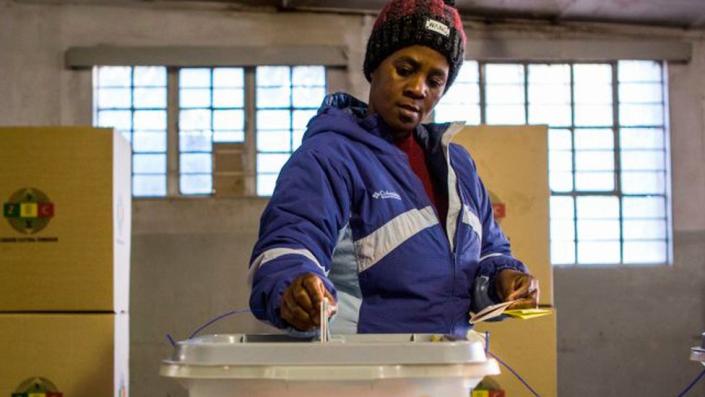Binance lays off employees days after executive exodus

Updated Fri, July 14, 2023
By Jaiveer Shekhawat
(Reuters) -Cryptocurrency exchange Binance has cut jobs just days after it was hit by a wave of executive exits, a source familiar with the matter told Reuters on Friday.
The layoffs at the world's biggest crypto exchange come at a time when the industry's future in the U.S. market is uncertain, with regulators aggressively clamping down on what they deem are illegal activities.
The job cuts were first reported by the Wall Street Journal, which said more than 1,000 people had been let go in recent weeks.
"As we continuously strive to increase talent density, there are involuntary terminations. This happens in every company. The numbers reported by media are all way off," Binance CEO Changpeng Zhao tweeted, adding that the exchange is "still hiring."
Last month, the Securities and Exchange Commission (SEC) sued Binance and Zhao for allegedly operating a "web of deception." Binance has said it would defend itself vigorously.
The lawsuits against Binance and peer Coinbase Global underpin SEC Chair Gary Gensler's tough approach towards the industry, but a U.S. judge recently siding with crypto firm Ripple Labs highlights that the regulator is facing an uphill battle.
Applications for spot bitcoin exchange-traded funds (ETFs) from asset management giants BlackRock and Fidelity have also been viewed as a vote of confidence for the industry.
"Over the last six years, we have grown from 30 to a team of almost 8,000 across the globe. As we prepare for the next major bull cycle, it has become clear that we need to focus on talent density across the organization to ensure we remain nimble and dynamic," a spokesperson for Binance said.
Last week, a string of executives quit Binance, which included its Chief Strategy Officer Patrick Hillmann.
(Reporting by Kanjyik Ghosh and Jaiveer Shekhawat and Pritam Biswas in Bengaluru; Editing by Shailesh Kuber)
BlockFi Management Ignored Warnings About FTX and Alameda, Creditors Allege
Jonathan Randles
Fri, July 14, 2023

(Bloomberg) -- BlockFi Inc. executives dismissed repeated warnings from its risk management team about not issuing substantial loans to Sam Bankman-Fried’s Alameda Research that were collateralized with digital tokens created by FTX, BlockFi creditors allege in a newly unsealed report.
The report, prepared by a committee representing BlockFi unsecured creditors, blames the crypto lender’s failure on missteps made by Chief Executive Officer Zac Prince and other senior managers. The creditors’ findings were made public Friday, days after BlockFi released its own investigation contending Prince and other executives had little reason to worry about lending to Alameda before Bankman-Fried’s platform collapsed amid allegations of fraud.
The committee said as early as August 2021, BlockFi had a copy of an Alameda balance sheet showing the trading firm relied substantially upon FTT, a digital token created by FTX. Alameda’s over-reliance on FTT “set off alarms at BlockFi,” the committee said, but those concerns were dismissed by Prince. The report quotes Prince saying in an email that Alameda represented “the largest/clearest growth opportunity we have.”
The FTT token played a major role in FTX’s failure. In early November, industry publication Coindesk reported on the same balance sheet BlockFi had, triggering a public run on FTX that forced Bankman-Fried’s platform into bankruptcy within days, according to the committee’s report.
Aside from allegedly dismissing red flags from FTX, the committee claims BlockFi’s business was “fundamentally flawed” because it required riskier investment counterparties to deliver high customer returns. That meant BlockFi could only do business with a relatively small number of firms, like Alameda, capable of delivering high enough returns to pass on to customers, including failed crypto hedge fund Three Arrows Capital Ltd. and a Bitcoin trust launched by Grayscale Investments, the committee said.
Prince’s lawyers didn’t return a message seeking comment and a BlockFi spokesman referred to the company’s earlier investigation. BlockFi disputes the committee’s conclusions, which the company described as misleading, and denies Prince or other executives ignored warnings about Alameda and FTX. Criticisms about BlockFi’s business could be leveled against any lending business, the company said.
FTX Concerns
BlockFi said executives performed reasonable due diligence before entering into transactions with Alameda and implemented checks on Prince’s decision-making authority. The crypto lender said management supported the transactions in part because Alameda quickly returned $1 billion in loans last year, before FTX collapsed. The company is seeking to settle allegations against Prince and other BlockFi executives in exchange for their help in valuable litigation involving FTX and other firms it did business with.
The committee’s report said some BlockFi executives were concerned about FTX. A year before Bankman-Fried’s platform unraveled, BlockFi Co-Founder and Chief Operating Officer Flori Marquez said to Prince in a series of Slack messages that using FTT as collateral “just sounds sketchy” and asked about associated risks.
Prince wrote “if FTX went down, FTT was going down with it.”
“That’s my concern,” Marquez responded.
“and we would be sitting on a pile of worthless FTT in our fireblocks wallet,” Prince said.
Lawyers for Marquez didn’t return a message seeking comment. BlockFi said in its earlier report that the committee mischaracterized the Slack exchange. Prince wasn’t discussing the value of FTT, the company said, but instead discussing the risks and benefits of taking the tokens as collateral and staking them on FTX’s platform for additional yield. He was expressing that if Bankman-Fried’s platform went down, it wouldn’t matter where the FTT is custodied, according to BlockFi’s lawyers.
BlockFi filed for Chapter 11 protection in late November and is planning to liquidate in bankruptcy in an effort to repay customers as much as possible.
The case is BlockFi Inc., 22-19361, US Bankruptcy Court for the District of New Jersey (Trenton).
Muyao Shen, Yueqi Yang and Sidhartha Shukla
Thu, July 13, 2023
(Bloomberg) -- It was a day that started with something of a bang: the charismatic Alex Mashinsky, former chief executive officer of bankrupt crypto lender Celsius Network under arrest and charged with fraud.
In a flurry of enforcement activity, the US Department of Justice, Securities and Exchange Commission, Commodity Futures Trading Commission, and the Federal Trade Commission all filed lawsuits Thursday against both Mashinsky and Celsius itself.
Allegations against Mashinsky ranged from pumping up the price of CEL, the lender’s native token, to wire fraud. Mashinsky has pleaded not guilty and will be released on bail after agreeing to a $40 million personal recognizance bond.
Then, shortly before noon, a judge issued a long-awaited ruling in the case of the SEC v Ripple Labs Inc. that sent crypto Twitter into a frenzy and token prices soaring. US District Judge Analisa Torres held that XRP, the token associated with Ripple Labs and central to the case, is a security when offered to institutional investors but not the general public.
“Institutional buyers would have understood that Ripple was pitching a speculative value proposition for XRP with potential profits to be derived from Ripple’s entrepreneurial and managerial efforts,” the judge wrote.
But Torres ruled that finding didn’t apply to programmatic investors, meaning the broader public. She said there was no evidence that such investors could parse the many statements made by Ripple about XRP, and found that many statements cited by the SEC may not have been shared with the broader public.
Whether cryptocurrencies are securities has been a major question hanging over the industry, which has long fought efforts to regulate it by arguing that the tokens do not meet the necessary criteria.
XRP almost doubled, soaring to as much as 94 US cents on Thursday before easing back to 78 cents as of 1:20 p.m. on Friday in Singapore. An offshoot of XRP, Stellar’s XLM, also surged.
Other tokens that were recently described as unregistered securities by the SEC increased too: Solana is up about 30% since the ruling and Cardano 25%. Bitcoin held a 3% gain to roughly the highest since June 2022, while Ether breached $2,000.
“Judge Torres’ decision in Ripple is a huge win for the cryptocurrency and digital asset industry,” said Arthur G. Jakoby, co-chair for Securities Litigation and Enforcement at the law firm Herrick Feinstein LLP. “If upheld on appeal, this decision significantly narrows the SEC’s jurisdiction over the crypto market.”
Shares of crypto-dependent companies also rallied. Coinbase Global Inc. rose the most since its public debut, closing Thursday at $107. The exchange is embroiled in a lawsuit of its own with the SEC that alleges that it sold tokens that are unregistered securities.
“This underscores that direct sales of digital assets by an issuer will often be securities, but other sales, most notably sales on the secondary market, are unlikely to be deemed securities, which is a key argument in Coinbase’s defense against the SEC,” said Elliott Stein, Bloomberg Intelligence senior analyst for litigation.
MicroStrategy jumped 11.7% and crypto miner Marathon Digital closed more than 14% higher on the day.
“My overall impression is this is a positive decision for the digital asset industry,” said Daniel Tramel Stabile, partner at Winston & Strawn. “The court expressly concluded that XRP is not, in and of itself, a security. Instead, the focus must be on the circumstances of the offering itself.”
The SEC sued San Francisco-based Ripple and top executives in December 2020. At the time, the regulator accused the company, co-founder Christian Larsen and Chief Executive Officer Brad Garlinghouse of misleading investors in XRP by selling more than $1 billion worth of the tokens without registering them, depriving investors of information about the cryptocurrency and about Ripple’s business.
Even prior to the day’s enthusiastic price action, cryptocurrencies have been on a tear.
In recent weeks, a raft of filings for spot Bitcoin ETFs in the US, driven in large part by an application by Wall-Street heavyweight BlackRock Inc., has reinvigorated traders who’d been buffeted by the long crypto winter.
Bitcoin has risen around 90% in 2023, rebounding from a rout last year that was exacerbated by a string of industry scandals and bankruptcies, including that of Mashinsky’s Celsius. The token remains some way below its all-time high of almost $69,000 in 2021.
--With assistance from David Pan, Chris Dolmetsch and Allyson Versprille.
Bloomberg Businessweek


























